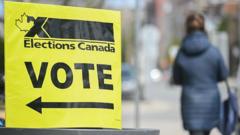In a surprise turn of events, the Canadian election landscape is being reshaped by the Greater Toronto Area (GTA), historically a bastion of the Liberal Party. The trajectory for the Trudeau-led Liberals, who have ruled for nearly a decade, faced an unexpected and monumental defeat in a special election last year in downtown Toronto. This shocking loss—particularly as the seat had been held by the Liberals for 28 years—marked a significant turning point in the political climate, initiating discussions about Justin Trudeau's potential resignation and paving the way for the upcoming federal election.
Canada's Electorate Faces Pivotal Moment: Toronto's Swing Could Change Everything

Canada's Electorate Faces Pivotal Moment: Toronto's Swing Could Change Everything
As Canada braces for a crucial election, the shifting voter landscape in Toronto poses a significant challenge for the reigning Liberal Party.
As the election nears, all eyes are on the 56 seats available in the GTA, which comprises around seven million residents. Analysts predict that the outcome in this region will be critical in determining the next government amid escalating trade tensions with the United States following President Trump’s imposition of tariffs on Canadian goods. These tariffs have contributed to rising housing and food costs, giving the Conservative Party a renewed foothold in areas previously dominated by the Liberals.
The leading contenders for the prime ministership are Mark Carney of the Liberal Party and Pierre Poilievre of the Conservative Party. While Carney must address the fallout from past governance and shifting voter allegiance, Poilievre seeks to leverage the growing discontent among constituents to flip key districts. With the external pressures of international trade agreements looming, the results from the GTA could send reverberations throughout Canada’s political and economic future.
The leading contenders for the prime ministership are Mark Carney of the Liberal Party and Pierre Poilievre of the Conservative Party. While Carney must address the fallout from past governance and shifting voter allegiance, Poilievre seeks to leverage the growing discontent among constituents to flip key districts. With the external pressures of international trade agreements looming, the results from the GTA could send reverberations throughout Canada’s political and economic future.





















